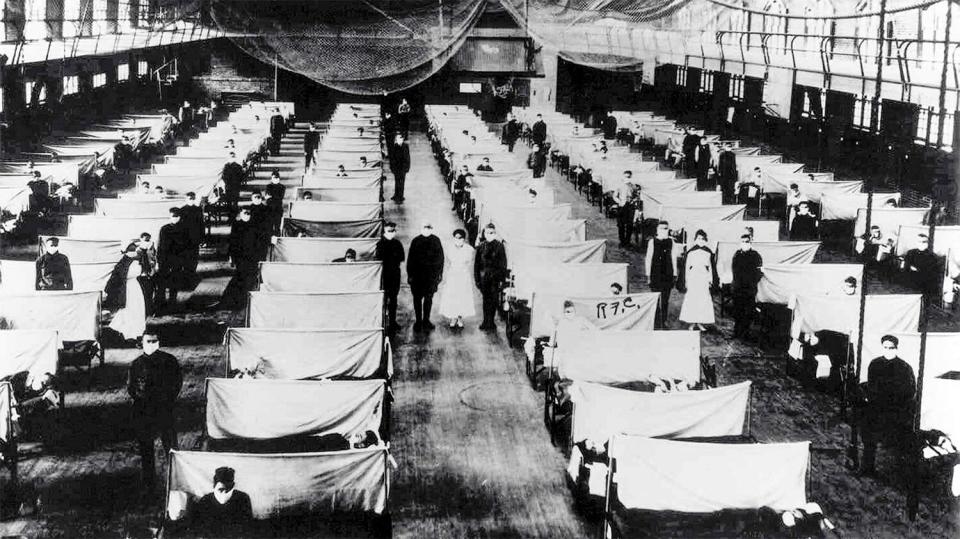U.S. COVID-19 Death Toll is Now Higher Than That of the 1918 Influenza Pandemic

- Oops!Something went wrong.Please try again later.
PIERO CRUCIATTI/AFP via Getty
With the coronavirus pandemic now in its 19th month, the U.S. is grappling with a new reality.
The death toll from the COVID-19 pandemic has now surpassed 676,000, according to Johns Hopkins University. That number exceeds the estimated 675,000 deaths that occurred in the United States during the Great Influenza pandemic of 1918.
Despite the fact that over 675,000 people in the United States have now died from the current coronavirus pandemic, many Americans are still not heeding the lessons learned from the health crisis of 103 years ago to be better prepared this time around, according to epidemiologist Stephen Kissler of the Harvard T. H. Chan School of Public Health.
RELATED: 1 in 500 Americans Have Now Died of COVID-19
"A lot of the mistakes that we definitely fell into in 1918, we hoped we wouldn't fall into in 2020," Kissler told CNN. "We did."
"If you would have talked to me in 2019, I would have said I'd be surprised," Kissler added, regarding the new development. "But if you talked to me in probably April or May 2020, I would say I would not be surprised we'd hit this point."

Universal History Archive/Universal Images Group via Getty
Many factors contribute to the continued prevalence of the coronavirus, from new variants to the millions of unvaccinated Americans.
Dissemination of misinformation among the public has contributed as well, such as social media-driven campaigns to rely on unproven treatments.
Added to that, the pandemic has prevailed as people, as well as city and state governments, continue to abandon safety precautions prematurely.
Multiple large-scale studies have found that vaccines are safe. There is no scientific link between vaccines and autism, according to the Centers for Disease Control and Prevention.
Additionally, public health expert Dr. Leana Wen recently told PEOPLE that impotency is not a known side effect of any of the COVID-19 vaccines that are currently authorized by the Food and Drug Administration.
"It is just not true that getting the COVID-19 vaccine is associated with infertility in either males or females," Dr. Wen, who is an emergency physician and public health professor at George Washington University, said.
As seen more recently with the notable uptick of COVID-19 cases among younger age groups, the false sense of security felt among younger and healthier demographics has proven to be a mistake.
RELATED VIDEO: Disney World Area Is in COVID 'Crisis' According to Orange County Executive
While the sheer number of COVID deaths in the country and the world is staggering, it's important to note that the U.S. population is now triple what it was in 1918 — meaning that even though the current COVID-19 death toll is higher, the 1918 flu pandemic most likely killed a higher proportion of Americans, as Kissler pointed out.
But the fact remains that despite the many technological, scientific and medical advances of the past century, the COVID-19 pandemic remains a major health crisis, one that can now be considered the most deadly pandemic in the nation's history.
The U.S. is still falling short of the stated goal of getting 70% of Americans fully vaccinated against COVID-19, but is making progress. As of Sept. 20, 63.9% of the U.S. population — or 212,035,328 people — have received at least one dose of a COVID-19 vaccine and 54.7% are fully vaccinated, according to the CDC. Of the population that is eligible for the vaccine, those aged 12 and up, 74.7% have received at least one dose and 64% are fully vaccinated.
As information about the coronavirus pandemic rapidly changes, PEOPLE is committed to providing the most recent data in our coverage. Some of the information in this story may have changed after publication. For the latest on COVID-19, readers are encouraged to use online resources from the CDC, WHO and local public health departments. PEOPLE has partnered with GoFundMe to raise money for the COVID-19 Relief Fund, a GoFundMe.org fundraiser to support everything from frontline responders to families in need, as well as organizations helping communities. For more information or to donate, click here.

